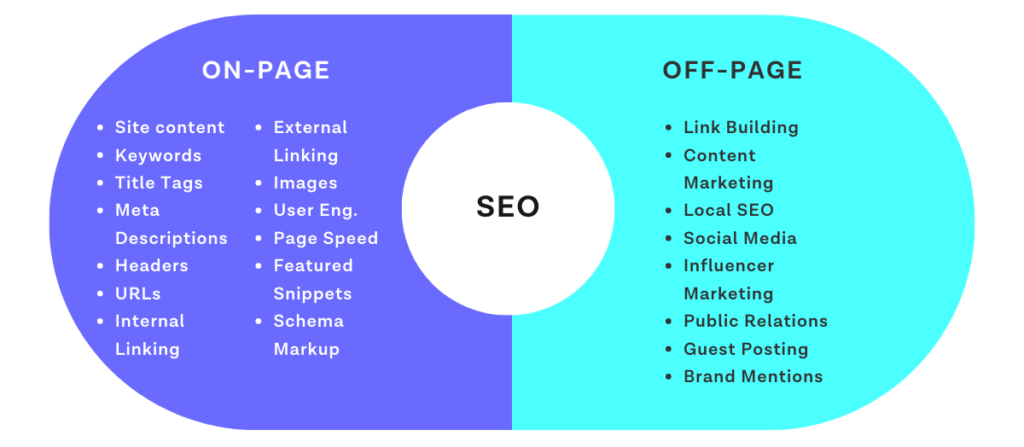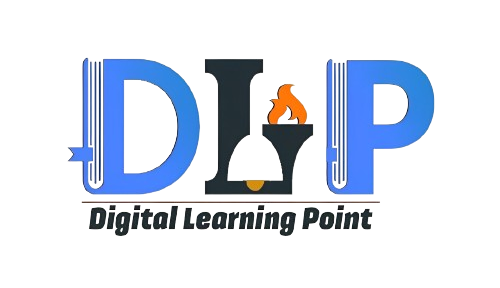
For your internet site to appear better in search engine results, to acquire organic visitors, and to succeed online, SEO (search engine optimization) is critical. On-web page search engine marketing and off-web page search engine marketing are the 2 major factors that contribute to search engine optimization. Comprehending the variations and complementary components between those elements is essential to crafting a complete search engine optimization plan. This blog will discover the intricacies of on-page and off-page search engine optimization, elucidating their significance and presenting practical hints for execution.
What is On-Page search engine optimization?
On-page search engine advertising and marketing refers to the optimization of men’s or women’s internet pages to rank better and earn more relevant site visitors in search engines like Google and Yahoo. It involves improving various elements of the interior of your internet website, which affects search engine rankings and consumer enjoyment. The intention is to make your website online more comprehensible and handy to each customer and search engine crawlers.
Key Elements of On-Page Search Engine Advertising
1. Keyword Research:
- Importance: Identifying the right key phrases is the muse of on-net page search engine advertising. Keywords are the terms and phrases that customers enter into searches while looking for statistics.
- Actionable Tip: Use gadgets like Google Keyword Planner, Ahrefs, and SEMrush to find applicable keywords with a good balance of looking for quantity and opposition. Focus on long-tail key phrases that are more unique and less competitive.
2. Title Tags:
- Importance: Title tags are HTML elements that explain the title of an internet web page. They are vital for both SEO and user experience.
- Actionable Tip: Create concise, descriptive, and key-phrase-wealthy titles for every internet page. Ensure that titles mirror the content and are no longer than 60 characters to avoid truncation when looking for outcomes.
3. Meta Descriptions:
- Importance: Meta descriptions are summaries of an internet page’s content. They seem to be underneath the identify tag in searching for results and have an impact on click-through fees.
- Actionable Tip: Write compelling meta descriptions that encompass key phrases and offer a clean examination of the internet web page content material. Keep them below a hundred and sixty characters.
4. Header Tags (H1, H2, H3, and so forth.):
- Importance: Header tags shape your content material, making it easier for users and customers to understand the hierarchy and essential factors.
- Actionable Tip: Use H1 tags for the primary name of the internet web page and H2-H6 tags for subheadings. Include relevant key phrases in your headers.
5. Content Quality:
- Importance: High-quality content material that offers value to customers is important for ranking nicely in engines like Google.
- Actionable Tip: Create informative, attractive, and true content material that addresses the goals and questions of your Google Market. Use keywords correctly when keyword stuffing.
6. URL Structure:
- Importance: Clean and descriptive URLs assist engines like Google in recognizing the content material of your pages.
- Actionable Tip: Use brief, keyword-rich URLs that suggest the page’s problem. Avoid using complex strings of numbers and characters.
7. Internal linking:
- Importance: Internal links are a part of your web pages, supporting customers and engines like Google to navigate your web page more successfully.
- Actionable Tip: Strategically link to relevant pages inside your website to enhance the flow of information and distribute web page authority.
8. Mage Optimization:
- Importance: Optimized snapshots decorate page load pace and offer more opportunities for keyword usage.
- Actionable Tip: Use descriptive, keyword-wealthy record names and alt text for snapshots. Compress photos to reduce document size without compromising first-rate.
What is Off-Page SEO?
Off-net page seek engine advertising refers to movements taken outside of your private internet website online to affect your rankings while you are trying to find engine outcomes pages (SERPs). It entails enhancing your web page’s authority and reputation via outside factors. The number one consciousness of off-web page search engine advertising is constructing notable oneway links from different websites, however, it’s also social media marketing and advertising, influencer outreach, and emblem mentions.
Key Elements of Off-Page Search Engine Advertising
1. Backlinks:
- Importance: Backlinks are links from distinct websites to your web page. They are an essential element in identifying your website’s authority and ranking functionality.
- Actionable Tip: Aim to accumulate one-way hyperlinks from high-authority, relevant web websites. Engage in traveler blogging, create shareable content, and assemble relationships with employer influencers.
2. Social media marketing:
- Importance: Social media structures can force site visitors to your internet website and boost its visibility.
- Actionable Tip: Actively promote your content on social media channels. Engage with your target audience by responding to comments and including elements in applicable discussions.
3. Influencer Outreach:
- Importance: Collaborating with influencers can enhance your logo’s credibility and gain.
- Actionable Tip: Identify and connect with influencers in your industry. Offer them valuable content material or collaboration opportunities that benefit every activity.
4. Brand Mentions:
- Importance: Mentions of your brand on other websites, even without direct hyperlinks, can affect your SEO.
- Actionable Tip: Monitor emblem mentions using gear like Google Alerts and engage with the bringing up of net websites to build relationships and doubtlessly gather inbound hyperlinks.
5. Local search engine optimization:
- Importance: For organizations with a physical presence, close-by search engine optimization is important for attracting close-by customers.
- Actionable Tip: Optimize your Google My Business list with correct facts, inspire consumer critiques, and use nearby keywords for your content.
6. Content Marketing:
- Importance: High-exquisite, shareable content can entice returned links and social stocks, improving your site’s authority.
- Actionable Tip: Produce precious content together with blog posts, infographics, movement pictures, and ebooks that resonate with your target market and encourage sharing.
The Synergy Between On-Page and Off-Page Search Engine Optimization
While on-net page and stale-page SEO reputations depend on unique elements of optimization, they may be interdependent and work first-rate while blended. On-web page search engine optimization ensures that your internet site is well-established and gives a super client experience, making it more attractive to each customer and search engines like Google. Off-web web page search engine marketing enhances your web page’s authority and trustworthiness through outdoor validation and lower back hyperlinks. On-Page and Off-Page SEO
Building a Balanced search engine marketing Strategy
To achieve the most beneficial results, integrate every on-web page and off-web page search engine advertising technique. Here’s how you could create a balanced approach:
1. Start with On-Page SEO:
Ensure your website is technically sound, user-pleasant, and filled with awesome, optimized content material.
2. Promote Your Content:
Use off-internet web page search engine optimization techniques like social media advertising, influencer outreach, and content material fabric advertising to promote your content material and lure inbound hyperlinks.
3. Monitor and Adjust:
Regularly analyze your search engine marketing overall performance with the use of equipment like Google Analytics and Search Console. Adjust your techniques based totally on the statistics to continually enhance your scores.



Thanks for sharing this helpful resource! I’ve bookmarked it for future reference. You might also find this article interesting: SEO: Top 5 Mistakes that can drag your website down